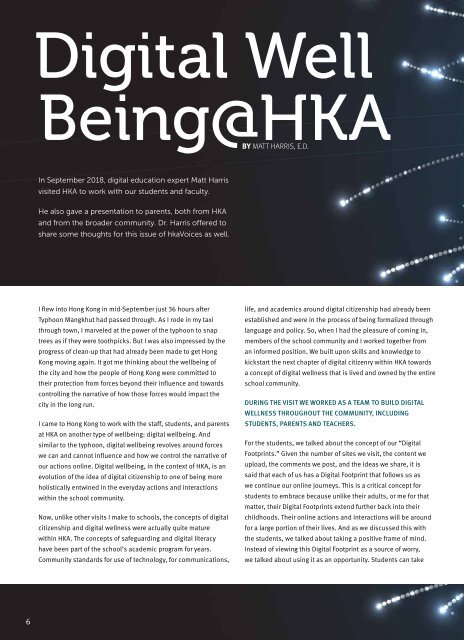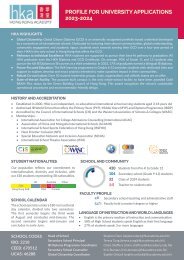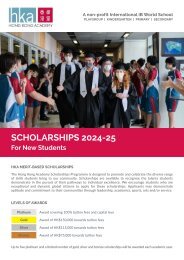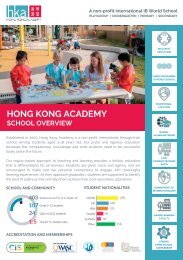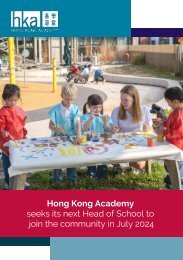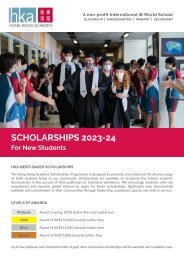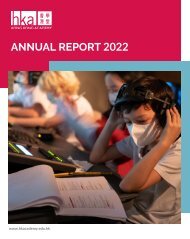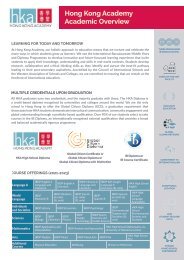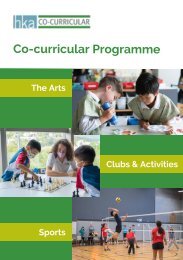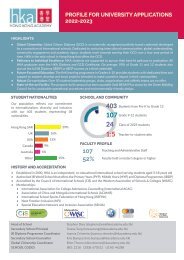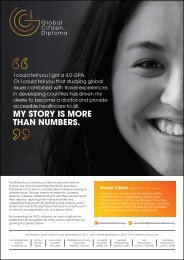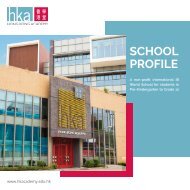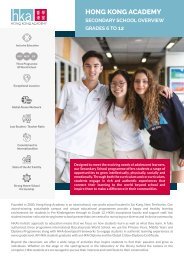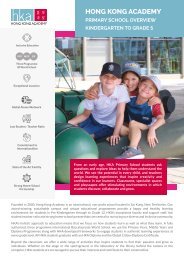Create successful ePaper yourself
Turn your PDF publications into a flip-book with our unique Google optimized e-Paper software.
Digital Well<br />
Being@HKA<br />
by Matt Harris, E.D.<br />
In September <strong>2018</strong>, digital education expert Matt Harris<br />
visited HKA to work with our students and faculty.<br />
He also gave a presentation to parents, both from HKA<br />
and from the broader community. Dr. Harris offered to<br />
share some thoughts for this issue of hkaVoices as well.<br />
I flew into Hong Kong in mid-September just 36 hours after<br />
Typhoon Mangkhut had passed through. As I rode in my taxi<br />
through town, I marveled at the power of the typhoon to snap<br />
trees as if they were toothpicks. But I was also impressed by the<br />
progress of clean-up that had already been made to get Hong<br />
Kong moving again. It got me thinking about the wellbeing of<br />
the city and how the people of Hong Kong were committed to<br />
their protection from forces beyond their influence and towards<br />
controlling the narrative of how those forces would impact the<br />
city in the long run.<br />
I came to Hong Kong to work with the staff, students, and parents<br />
at HKA on another type of wellbeing: digital wellbeing. And<br />
similar to the typhoon, digital wellbeing revolves around forces<br />
we can and cannot influence and how we control the narrative of<br />
our actions online. Digital wellbeing, in the context of HKA, is an<br />
evolution of the idea of digital citizenship to one of being more<br />
holistically entwined in the everyday actions and interactions<br />
within the school community.<br />
Now, unlike other visits I make to schools, the concepts of digital<br />
citizenship and digital wellness were actually quite mature<br />
within HKA. The concepts of safeguarding and digital literacy<br />
have been part of the school’s academic program for years.<br />
Community standards for use of technology, for communications,<br />
life, and academics around digital citizenship had already been<br />
established and were in the process of being formalized through<br />
language and policy. So, when I had the pleasure of coming in,<br />
members of the school community and I worked together from<br />
an informed position. We built upon skills and knowledge to<br />
kickstart the next chapter of digital citizenry within HKA towards<br />
a concept of digital wellness that is lived and owned by the entire<br />
school community.<br />
During the visit we worked as a team to build digital<br />
wellness throughout the community, including<br />
students, parents and teachers.<br />
For the students, we talked about the concept of our “Digital<br />
Footprints.” Given the number of sites we visit, the content we<br />
upload, the comments we post, and the ideas we share, it is<br />
said that each of us has a Digital Footprint that follows us as<br />
we continue our online journeys. This is a critical concept for<br />
students to embrace because unlike their adults, or me for that<br />
matter, their Digital Footprints extend further back into their<br />
childhoods. Their online actions and interactions will be around<br />
for a large portion of their lives. And as we discussed this with<br />
the students, we talked about taking a positive frame of mind.<br />
Instead of viewing this Digital Footprint as a source of worry,<br />
we talked about using it as an opportunity. Students can take<br />
6


